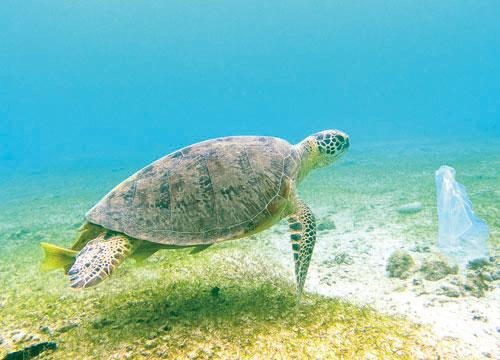Conversation A
對(duì)話A
Taylor: I liked your program about sea turtles, Rob. I learned a lot.
泰勒:羅布,我喜歡你那期關(guān)于海龜?shù)墓?jié)目。我學(xué)到了很多。
Rob: What did you learn?
羅布:你都學(xué)到了什么?
Taylor: Turtles lay their eggs in the sand. The temperature of the sand is important.
泰勒:海龜在沙子里產(chǎn)卵。沙子的溫度很重要。
Rob: I know! If the sand is hotter, more baby turtles will be female.
羅布:是啊!如果沙子更熱一些,小海龜更多的會(huì)是雌性。
Taylor: But the turtle's habitat is disappearing.
泰勒:但是海龜?shù)臈⒌卣谙А?/div>
Rob: Yes. People build on beaches. So turtles don't have a place to make a nest.
羅布:是啊。人們在沙灘上建造房屋。所以海龜沒有地方筑巢了。

Conversation B
對(duì)話B
Linda: What do you think about turtles, Alex?
琳達(dá):阿萊克斯,你覺得海龜怎么樣?
Alex: Well, they're delicious.
阿萊克斯:恩,它們味道很不錯(cuò)。
Linda: Alex! That's terrible.
琳達(dá):阿萊克斯!你也太可怕了。
Alex: I'm just joking. But some people do like to eat turtles.
阿萊克斯:我開個(gè)玩笑。但是有一些人確實(shí)喜歡吃海龜。
Linda: They shouldn't. Five of the seven kinds of sea turtles are in danger. We should protect them, not eat them.
琳達(dá):他們不應(yīng)該這樣。七種海龜中有五種已經(jīng)瀕臨滅絕。我們應(yīng)該保護(hù)它們,而不是吃它們。
Alex: Yes. We can stop hunting them. And we can use less plastic, too. If turtles eat plastic, they will get sick.
阿萊克斯:是的。我們可以停止獵殺它們。我們也可以少用塑料。如果海龜吃了塑料,它們就會(huì)生病。












